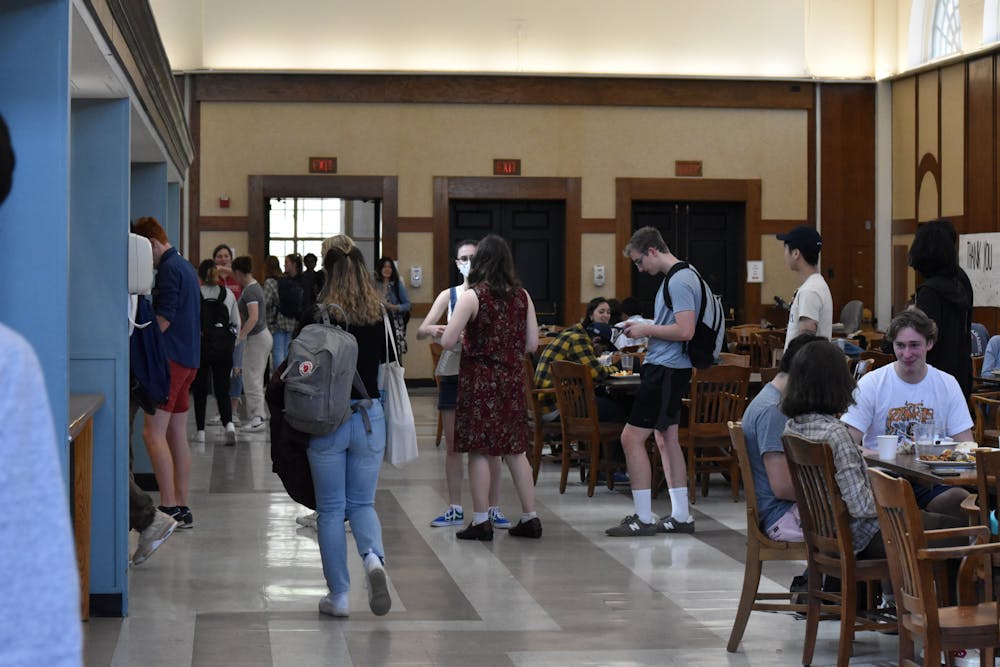Brown Dining Services has begun construction on new kosher and allergy-friendly kitchens, as well as an enhanced halal station, in the Sharpe Refectory, according to a Nov. 14 Today@Brown announcement from Vice President of Dining Programs George Barboza. Construction is expected to be completed during summer 2023, with the new facilities in full operation by the start of the fall semester.
Barboza also announced that the University is planning renovations to Josiah’s that would increase the dining hall’s seating capacity and expand menu options. The renovation is set to take place over the summer and planned to be completed by August 2023.
BDS is “looking forward to providing these three new stations that give us the ability to produce in smaller batches, offer an open kitchen concept and continue to provide high quality, healthy and delicious food,” Barboza wrote in an email to The Herald.
Initial construction plans, student excitement
The new kosher kitchen will include two separate kitchens for meat and dairy preparation, Barboza wrote in the announcement. The kitchens will be staffed by a full-time Mashgiach — a supervisor to ensure the kitchen maintains kosher standards — and chefs who “are trained in kosher menu concepts.”
Deborah Cherman ’25, who eats kosher at Brown, said that she was excited about the new constructions, despite no longer being on a meal plan. Cherman has friends who are “still on the kosher meal plan and are even more excited than I am about the” renovation.
The halal station, which will be located across from the kosher kitchens, will serve as a “dedicated space for all students looking to access food prepared in accordance with Islamic law,” according to Barboza’s announcement. The station will feature “halal recipes and menu concepts, with all meat purchased and served through the week certified as halal,” the announcement continued, though BDS is still in the early stages of planning these menus.
Sameerah Munshi ’23, president of the Brown Muslim Students' Association, said that she was excited that the additional halal options would bring “more visibility and more awareness … to the needs and practices (of Muslim students).”
“I’ve been very touched with how willing Brown is and how willing the dining workers are to work with our needs,” she added.
The refectory’s new allergy-friendly kitchen will be “free of the nine most common food allergens: peanuts, tree nuts, eggs, dairy, fish, shellfish, soy, sesame and gluten,” Barboza noted in the announcement. It will also use equipment and cookware that is separate from the main kitchen.
Tyler Melwani ’24, a member of the University’s Dining Council — a committee of students and Brown’s dietician dedicated to addressing University dining issues — wrote in an email to The Herald that he is “aware of (student) concerns about cross-contamination … so it is a huge win for students with dietary restrictions to have a section of the dining hall that they can always trust.”
Student hesitancy
While Cherman is excited by the prospect of a kosher kitchen, she is curious about how BDS will regulate the kitchen to ensure it actually remains kosher.
“Keeping a kitchen kosher is more than just making it a separate kosher-designated area,” she said. In order for food to be kosher, the kitchen that prepares it must follow the rules of Kashrut — such as keeping utensils that touch meat and dairy separate.
While Fatima Yousaf ’25, who eats halal, is “happy that there’s more options now,” she expressed concerns about the quality of food that will be offered at the new halal station. According to the BDS website, students on the halal meal plan currently get access to chicken dishes that “are certified halal in the dining halls along with special dishes around campus.”
Munshi said that in the past, dining halls have run out of halal food as non-Muslim students who do not strictly eat halal often take such dishes. “I’m a bit worried about that still kind of happening,” even with a designated halal station, she said.
“Having a dedicated halal station will increase our capacity to offer more amounts of halal offerings,” Barboza wrote in an email to The Herald. “Students can continue to rely on the fresh chicken dishes throughout all Brown Dining units to remain halal in addition to a variety of other offerings at the halal station.” The new stations will be available to all students on a meal plan.
Melwani noted in his email that other dining halls could have benefited more from new offerings as “the Ratty (is) already one of the best dining halls for people with dietary restrictions.”
Melwani has also heard skepticism from students with allergies on “whether the new food offerings will taste good and have variety.”
“The basis of (allergy-friendly kitchen) meals is that they will have easy-to-identify ingredients,” Barboza wrote. “Students will continue to be able to ‘shop’ the dining hall for foods that fit their needs, or they can choose to eat primarily at the allergy-friendly kitchen.”
Jennifer Shim was a University News editor at The Herald.





